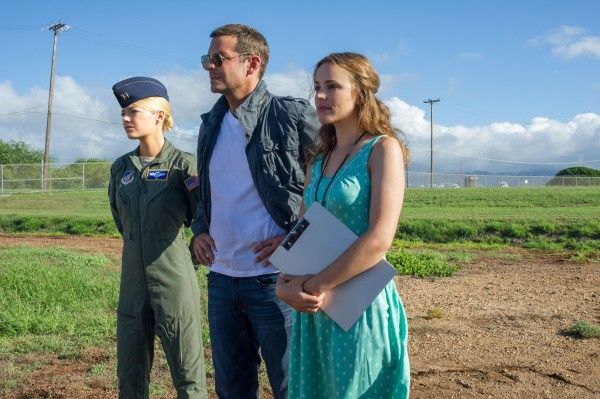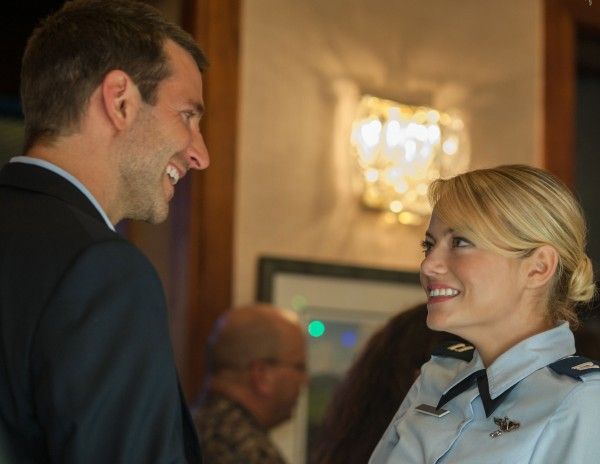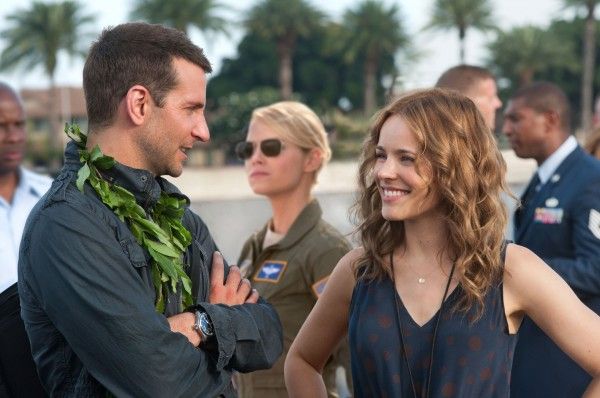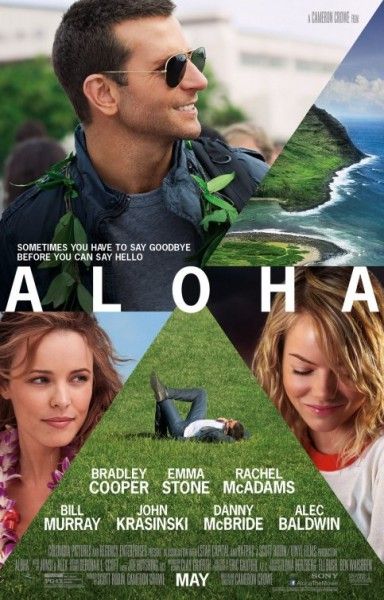It appears that Cameron Crowe scribbled out the idea for Aloha on a cocktail napkin during his vacation to Hawaii, and decided that was good enough. His latest film is so shockingly incoherent and inept that it borders on the surreal. Throughout the film, I found myself wondering, “What movie is this?” Not, “What am I watching?” which would imply that I was intrigued or curious. Instead, I was captive to a writer-director who has apparently lost touch with reality, proper storytelling, understanding character perspective, and pretty much everything that goes into making a compelling film.
Brian Gilcrest (Bradley Cooper) is a hot-shot something or other (more on his horrible introduction in a bit) who has returned to Hawaii to negotiate a blessing for a bridge on behalf of the private space flight company run by Carson Welch (Bill Murray), although why this company requires a blessing and why Bryan is the only one who can procure it from the locals is as poorly explained as everything else in the movie. Bryan’s job requires an Air Force representative, so he’s stuck with the Manic Pixie Dream Girl Allison Ng (Emma Stone). While her requisite perkiness and optimism begin to draw Bryan out of his shell, he also tries to reconnect with his ex-girlfriend Tracy (Rachel McAdams), who broke up with him with 13 years ago and has since remarried the stoic pilot, Woody (John Krasinski) and had two kids: the precocious Mitchell (Jaeden Lieberher) who is always carrying a camcorder around even though this is 2015 and kids use their phones to take video, and Grace (Danielle Rose Russell), who is conspicuously twelve-years-old. Tracy and Woody are also feeling a strain on their marriage because of Bryan’s reappearance so there are subplots on subplots on subplots.
Aloha feels like a rough draft for a ragingly mediocre film. After the movie, my friends and I were still wondering what exactly Bryan does for a living. In the broadest sense, we know that he’s in Hawaii working for Carson, but his backstory is constantly unclear. Is he a consultant? A liaison? Is he an aerospace engineer or a pilot? The film has him perform so many roles, and none of them are well defined. In the opening scene, Brian’s voice over tells us he sold out and went over to the “grey side” by leaving the Air Force and working for Carson. But when Brian goes up to the cockpit on his way to Hawaii to talk to Woody, who’s piloting the plane, he doesn’t know that you need to put on a headset to talk because of the engine noise. It may seem like a minor detail, but Crowe couldn’t care less about details. He’s more hung up on telling us who Bryan is without ever showing us.
That becomes even more painful when it looks like Crowe found a way to make his lead actors embody the worst criticisms they’ve ever received. Bradley Cooper isn’t a bad actor, but Brian is defined more by what other characters say about him rather than anything Cooper brings to the table. According to supporting characters, Brian is along the lines of a self-destructive genius who would be a great guy if it weren’t for his reckless attitude. But none of this comes across in Cooper’s performance because he doesn’t seem to have a take on the character, which is understandable because Brian doesn’t behave consistently. In the span of a few minutes, he’ll go from aloof and taciturn to charming and extroverted. Nevertheless, Brian shows that Cooper lacks a distinctive presence. If you take away everything from him, he’s a handsome, affable guy but he lacks the personality of someone like Tom Cruise or Matt Damon.
Crowe’s far worse crime is taking the usually endearing and delightful Stone and making her come off as grating, contrived, and basically embodying all the other flaws of the Manic Pixie Dream Girl. That phrase was spawned by Nathan Rabin’s review of Crowe’s Elizabethtown, specifically in reference to Kirsten Dunst’s character. Crowe hasn’t learned from his mistake and he employs the same dynamic where a bubbly, perky, funny, earnest woman helps a depressed good-looking guy on his journey to becoming a better person. Having Allison constantly stress her affinity for Hawaii and how she’s one-quarter Hawaiian does not count as a rich, inner life. In Aloha, it manifests as a quirk and a way for Crowe to make a disingenuous hat tip towards Hawaiian culture.
Crowe is the guy who just went to Hawaii for the first time, and is still wearing his lei when he comes to tell you about his trip. He can’t stop regaling you with legends he heard and how the state is so neat and pretty and how you simply have to go. But like a middle-aged white guy wearing a Hawaiian shirt, Aloha is painfully lame. When Brian and Allison go to meet with a Hawaiian leader to negotiate the blessing, it may as well be Crowe trying to get an air of authentic local culture for his movie about the white guy who’s trying to get his life together.
I’m astounded that this is the work of a storyteller who’s been making movies for decades because it comes off like the first draft of a screenplay a college freshman wrote on the plane ride home from Oahu. It features lines like Allison telling Brian, “I don’t want to be another decal on your laptop because I couldn’t breathe!” It’s like Crowe forgot how people talk and think and behave. Instead, he’s thrown us into something that would be borderline experimental in how it’s detached from reality except that this is due to incompetence rather than design.
After the earnest-to-a-fault Elizabethtown, the earnest-to-a-shrug We Bought a Zoo, and now the earnest-to-nothing Aloha, I wonder if Cameron Crowe truly peaked with Almost Famous, a movie that clearly came from a personal place and that utilized all of his talents for crafting character, tone, and themes. There are flickers of Crowe’s talent in Aloha like Krasinski performance and Alec Baldwin as an angry general, but most of the picture is a contrived mess. When it comes to Cameron Crowe as a unique, talented voice in American cinema, Aloha signals that it’s time to say goodbye.
Rating: D-





